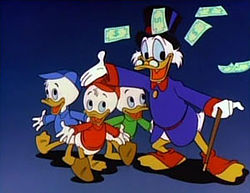Comic Books, Movies, And Novels – Where The Trine Meet
Recently former Writer’s Digest columnist Nancy Kress wrote a review of the movie Thor. In it she referred to the production as a “comic-book movie.” Whether or not you agree or disagree is beside the point (I haven’t see it, so can’t offer an opinion one way or the other). What I’m interested in is the idea that comic books, movies, and novels seem to be converging.
Take, for example, Christian speculative author Robin Parrish’s Dominion Trilogy featuring modern day superheroes. Robin capitalized on the comic book nature of his story by creating comic-book type promotional materials which he turned into a graphic novel. We have yet to see if his books will make it to the big screen, but the potential is there.
What I’m wondering is this: has the comic-book crowd affected the nature of movies and books forever?
Once I would have identified distinct differences (besides the obvious) between the three media.
 Comic books are snippets — of conversation, scenes, characters’ personalities. The result of this brevity is a loss of reality. Action seems overly dramatic, dialogue truncated, and characters flat (pun not intended). Uncle Scrooge McDuck, for instance, is a skinflint, Donald is a bumbling schemer and naive, and his three nephews — Huey, Dewey, and Louie — are rowdy but resourceful. What do readers know, however, of their doubts and fears? What are their internal struggles?
Comic books are snippets — of conversation, scenes, characters’ personalities. The result of this brevity is a loss of reality. Action seems overly dramatic, dialogue truncated, and characters flat (pun not intended). Uncle Scrooge McDuck, for instance, is a skinflint, Donald is a bumbling schemer and naive, and his three nephews — Huey, Dewey, and Louie — are rowdy but resourceful. What do readers know, however, of their doubts and fears? What are their internal struggles?
Movies, in contrast, excel in showing a story. The action is intense and very present. Consequently the emotions it generates in the viewers are tangible.
Then there are novels. These made the most of a more leisurely pace to flesh out characters. Without the limits of the camera-eye view required by (most) movies or the brevity of comic books, novels were free to explore internal conflicts and resulting heart changes.
With the amalgamation of the three media — or at least the borrowing of comic-book aspects by movies and novels — I wonder if readers and film buffs have gained or lost.
 Some might argue that the Spiderman movie, for example, did for that superhero what the comic book could not — bring the story to life. Apparently the novelization by author Peter David, did what the movie could not — flesh out the character’s motivations. From one Amazon review:
Some might argue that the Spiderman movie, for example, did for that superhero what the comic book could not — bring the story to life. Apparently the novelization by author Peter David, did what the movie could not — flesh out the character’s motivations. From one Amazon review:
What might not be translated on screen is the motivations and the incredibly well-written and fleshed out thoughts provided by the clever Mr. Peter David in this novel (A Customer, March 23, 2002).
The contemporary trend in writing, at least by some writers, makes me wonder if novels aren’t moving in the direction of comic books. I’ve read books in which the scenes are short and shorter, where the dialogue resembles sound bites, and the characters are as plastic as action figures.
Is this what the average reader wants? Are fully developed characters a thing of the past? Is “a quick read” to become the highest praise we can give a novel?
Just wondering, as summer reading season fast approaches.











































I don’t read comic books, but I do read and write manga (Japanese comic books), having teamed up with several artists. Intending on trying some classic comic books eventually but haven’t yet. 🙂
The manga I have read varies from deep character & plot development (webmangas 2Masters, E-Depth Angel, and Advocate Voice; and print mangas Bakuman and Fullmoon wo Sagashite for example) to shallow (many random shoujos and shounens that focus on the action or the b/g relationships too much such as the Megaman ZX manga adaptation) to right in the middle (print mangas +Anima and Pretear)
The relationships can be very simplistic in the shallower mangas, but very complex in the deeper mangas. It really depends on the manga-ka. A good manga will be equivalent to a film — just on paper instead of on the big screen.
So just so you know – mangas and comic books can be just as good as film and novels too! 😀
That being said, I see a definite trend in novels towards the style of film.
For example, I cringe at dialogue that just doesn’t flow in a novel – snappy one-liners that really depend on being audiovisual to be hilarious.
The way the scenes are set up in a book has been heavily influenced by film as well – having many scenes from random 3rd person POV who are not the MC/POV character such as the villain is a very film technique that in my opinion can be rather hard to pull off in a book.
I’ve decided to combat this in my own novels by not writing as many novels anymore. XD If I’ve got a wonderfully snappy one-liner, I’ll put it in a screenplay. If I’ve got a flashy scene that depends on facial expressions, lighting, or color to get the mood across, I’ll put it in a manga (or film, because to me the two are only differentiated in that it’s a lot cheaper to make a SF story into manga than film). I’m not fond of thought bubbles either way so I try to make everything obvious by the visuals.
To which of the Spider-Man films are you referring: the first, the second, or the (often-disliked) third? I’m guessing the third, based on the image provided, and on the fact that it explains characters’ motivations most poorly. The first film, and best of all the second film, are able to portray characters viewers come to care about without the aid of external adaptations.
I used the image of the third book because it was handy, Stephen. The quote from A Customer was about the first book. From what I find in the limited research I did, the second movie seemed to be the fan favorite. But all that needs to be weighed against what the novelization offered. Overwhelmingly, the novels got the nod for showing the characters more deeply.
Becky
I think each form of media has its own appeal. My wife and I have a vast collection of comics, spanning fifty years or more. Picking up a single comic is like reading only a page or two of a novel, watching one scene from a movie, or listening to a single song on movie soundtrack. They’re not self-contained. Most successful storylines span ten or fifteen interwoven titles, and go on for years. One character might have an entire run dedicated to his perspective alone. At the same time, one doesn’t need to read all twelve titles and mini-series to get the gist of the story. Comic books are immersive, and the reader gets to choose exactly how involved he or she wishes to be in the story.
If you’re only going to subscribe to a single title, the story will be shallower, but not because of the writers and artists. It will be shallower because you’re not fully immersing yourself in it.
That’s why there is so much room for easter eggs and cameos in comic-book based movies. Both Captain America and Thor get a nod in the second Iron Man movie. Wolverine’s movie was an amalgam of thirty years of comics and maybe three dozen titles (X-Men, Uncanny X-Men, Wolverine, Excaliber, X-Factor, Weapon X, X-Force, Alpha Flight, and numerous mini-series like Gambit, Origin, Wolverine & Sabertooth). If you were to read all the comics that had been poured into that movie, you’d find a much deeper, richer story. One that covers almost a century of history.
All of that is to say that one form of media isn’t better than another, or more of a feat than another, but that they’re simply different, and you cannot judge or appreciate the value of one by the expectations of another.
Well, Parrish started out publishing a chapter at a time on his e-magazine. That’s how I read most of book one.
What do you mean by ‘comic book style’? — I don’t think it’s quite how you’re depicting it.
You don’t think they’re as identifiably different? How so?
I’ve got a friend still teaching me how to write a movie screenplay, and let me tell you, he’s had to beat into me the differences. I want to skip to action. He’ll take one line of mine and yank a whole scene out of it. I don’t think visually. He does. I think of the entire Prologue of The Fellowship of the Ring as one scene. He probably would think of it in as many as eight scenes (without my going to watch and count, I’m guessing; it may not be quite that many). A phone call isn’t one scene in a movie: It changes every time the POV shifts. If the camera starts from above, pans, around, and slowly hones in on a house, that’s at least three scenes just to get to the door. For me, the constant breaks mess with my thought process, so I’m learning to lay out the scene headings first, then write the scene. We had to create fully developed characters and tell a whole story in 100 minutes or less.
I knew a girl back in school–she was an 8th grader, I was in 9th–who had a fully developed plot and very in-depth characters…all in a manga she was working on. She spent hours talking to me about how their personalities worked and their various relationships worked out. She knew at least as much as I did about my novel characters.
I really don’t think we can blame that on comic books. You can write a cinematic without compromising any of those things. I gotta go with Jenni and Jeremy on this one.
Also, not all comic books go the ‘superhero’ route, if my memory serves.
Not always. I’m admittedly a very prickly movie-goer. We watched one just yesterday that was a total dud. Some cool scenes, and I really liked the idea of the “sidekick” being the real hero. But beyond that, my favorite part’s when the sidekick finally loses his temper and beats the snot out of the ‘hero.’ It’s full of action. But the characters are incredibly flat.
There’s plenty of ‘leisurely paced’ novels, I agree. Where I disagree is that novels are by default ‘leisurely.’ They can’t rely on visual cues, so whereas a movie can show you the bad guy Matt Damon doesn’t see yet, a novel can’t without changing POV (or going omniscient). A movie can show in five minutes the state of an entire planet. A book takes much, much longer. That’s a constraint of medium, not caliber. A movie’s weakness is getting across all the subtext, inner thoughts, and exposition—but when it’s done well it’s fascinating.
Either way, I don’t think we can say a comic book’s episodic feel (and those better versed in the medium feel free to correct me) makes it lesser. First off, that’s like saying short films, TV shows, and short stories are inferior and incapable of fully developed plot and character as a result.
My understanding is it’s more like serial TV shows (my favorite kind, usually) or a short story collection where the character may be fully developed but revealed less quickly. In that way it’s similar to Leverage and Doctor Who, whose makers both lay claim that each episode (or two-parter, as DW does off and on) must behave like a mini-movie: They have to intro place, people, and problem in the first couple minutes and wrap the whole thing up in under an hour.
Now that’s talent, in my head. I can barely introduce them in that amount of time.
With the amalgamation of the three media — or at least the borrowing of comic-book aspects by movies and novels — I wonder if readers and film buffs have gained or lost.
How so? Even with the influx of superhero movies and the couple (badly, even if amusing) stylized, overdramatic ones I’ve seen, that’s still a small proportion of most movies (which I still think aren’t any good, but not because of stylization).
And yet MJ annoyed most people and I still don’t understand why Peter didn’t just freakin’ TELL the girl.
I think that has more to do with our society’s inability to focus. But either way, most actual readers don’t really care that much and can stick with the longer scenes. Besides, I hate to say it, but Twilight doesn’t do that. For all its flaws, those books (at least the first three) mostly stayed with a single, first person narrator (oh, why did it HAVE to be Bella’s?)
Now, I might agree that cinematic style is picking up steam: with a generation of visually stimulated people who think, for the most part, in that style, sure. But remember, film must also get across place, people, and plot. Sure, you always have people who like action over characterization and vice versa, but the greats do both. Even in a cinematic style you have to keep the story moving, you have to appeal to the senses, and you have to develop your characters. So I’ll say again: If novels are suffering as a result of cinematic style writing, then it’s the fault of the writers, not the style.
Serial TV shows are something I’ve only begun discovering in the past year–but it’s definately an interesting medium, because each episode needs to have its own arch, but still fit the overall season.
Hehe. It’s actually a big reason I don’t watch as much TV. The shows I like the best are the ones you can’t miss much of….and, well, I may not have much of a life, but it is mine. 0=)
“Has the comic-book crowd affected the nature of movies and books forever?”
The answer is no.
I think what you’re seeing is an effect caused by all three media industries all going after the same disposable income.
I have no idea if the reports are accurate ( I sure didn’t at the time) but those in power have it in their head that a certain age group and gender have a certain amount of disposable income that can be spent anywhere they wish.
When a certain comic book (issue, series, cross over or whatever) does amazingly well in sales you’ll have those people in the publishing and the motion picture industries examining it with a fine tooth comb to see how/why it sold and any factor that caused the sales that can, will be infused into the products being produced in the next quarter or year or whatever by the publishing and the motion picture industries.
You can make the same claim with the other two. When a novel or series of novels does amazingly well it attracts the attention of the comic book companies as well as the motion picture companies.
Then again when a movie does well, the publishers and comic book companies have a look at it as well.
Finally, lets not forget that both Marvel and DC are actually owned by companies in the movie business with print/publishing arms attached to them. DC is owned by Warner Bros. and Marvel was recently acquired by Disney so the crossing over of what makes a comic and what makes a movie are all lines that are bound to blur.
I agree as far as subject matter is concerned, BlaqueSaber, but I’m still wondering about the way novels are being written these days, and the way films are being written, too, for that matter.
Novels seem to be adopting the brevity approach and movies the over-dramatization of comic books. I’m wondering if this is a good thing.
Becky
Rebecca, I don’t believe you’re giving comics/graphic novels/manga etc. enough credit. Regarding comics, as with anything, there are the good and the bad examples, the quality and the rubbish, the deep and the shallow. What I see here is a lack of understanding of the comics medium. You can’t expect deep internal struggles within something like Duck Tales. It’s not designed to be anything more than good, clean, quick fun, mainly for kids. There are many examples of quality comics that have depth. It would be better to say that comics, in their brevity, make use of their economy of words. They have to communicate so much through visuals, the dialogue etc. is often secondary. I would argue that the comic/graphic novel/manga are the happy medium between movies and novels.
Christian, I have no doubt that comics, especially with the development of manga/graphic novels have grown up, even as novels have undergone a change. My thumbnail sketch of the three different media was meant as a “what they once were” look.
I am asking questions primarily about how comic books have influenced movies and novels, especially the latter, but I have no doubt that movies have influenced comic books (and perhaps led to graphic novels).
I think Morgan has it right. The powers that be look closely at what works and why, then try to incorporate those elements in all three media. She also mentioned music. I wonder how that affects the other. And I didn’t even mention TV. Surely that has had an influence too. And how about games? They seem to be related to story more now than they used to be.
Kaci mentioned that Twilight, a hugely successful book and then movie, did not employ any comic book elements (I have to take her word since I haven’t read or seen any in the trilogy). I’d say the same thing was true about Harry Potter. So the jury may be out about whether our various types of media are becoming more like each other or not.
I find it interesting to consider, however.
One of the last speculative books I read irritated me during the entire read because of the multiple points of view, frequent scene changes, and lack of continuity. Is that because of my personality or because I grew up with a different storytelling style than young adults today?
Or, in light of the YA novel successes that are so different from the comic book style, can we conclude that novels should retain their own format and readers prefer it that way?
Questions. Just asking questions. 😉
Becky
Well, I think I’m still needing to know what you mean by ‘comic book elements’ before I can try answering the questions.
If you just mean it has multiple POVs, scene changes, and continuity errors, I don’t think it’s accurate to blame comic books. But if you mean shallow plots, poorly developed characters, and bad dialogue, I also don’t think that’s to be laid at the comic book industry’s feet. And if you mean cinematic style, which isn’t a comic book thing either, I don’t think that’s accurate (and it’s actually quite powerful when it’s done right).
I think I know what you mean, but I don’t know what to rightly call it, and can only think offhand of two examples: one being The Green Hornet and one being….oh, it’s the one that sort of feels like an RPG and has the girl named Knives and another girl who has seven evil exes the protagonist has to defeat.
Anyway. I’m not trying to be a harpy, just to understand. 0=)
Speaking of comics, I thought the people here might be interested in a comic called ReMIND. It is not marketed as a Christian comic, but the writer/artist is a Christian (no idea what persuasion) and it came out of, among other things, his own struggles with faith.
The artwork is beautiful, and the story is very strange!
Only the first half has been written so far, and you can read it online, or buy it as a high-quality book.
http://www.remindblog.com/2009/11/03/remind-spread-1/
Kaci, I guess the overriding comic book element, in my mind at least, is brevity. That’s true for dialogue, certainly, but also for action. Snippets replace scenes. I suspect this may be having an effect on our novels and on our movies. Does it really matter where the influence comes from? I don’t think so.
And like most trends, it too may pass. We may even have a revolt and see more books like Harry Potter. Who knows? But I find it interesting to think about and to look at how writing is developing. 😀
Becky
Brevity is the soul of wit.
Also, a picture says a thousand words.